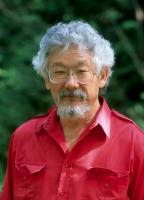David Suzuki, Canada’s best-known environmentalist, has spent a generation encouraging Canadians to look after the environment, but it seems they have not been listening.
While Canada ratified the 1997 Kyoto Protocol on limiting greenhouse gas emissions, the current, Conservative government says the standards cannot be met, reopening a debate he thought had been won.
“We’ve already been here before, and that’s the thing that breaks my heart,” he told Reuters during one of his frequent trips to Toronto from his home in Vancouver. “If we had taken it seriously and done something, we would be so far past the Kyoto target today, and the problems would be infinitely simpler and cheaper.”
Subscribe to our newsletter
Stay up to date with DeSmog news and alerts







